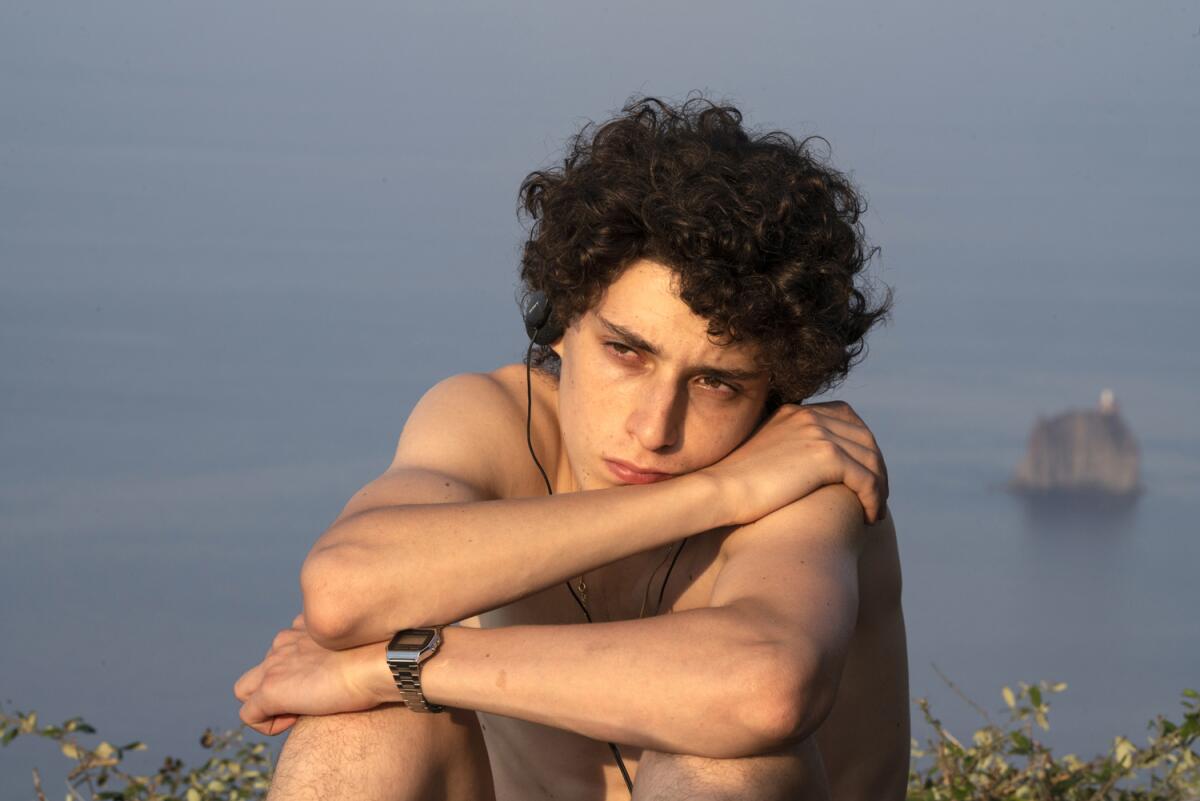Review: Paolo Sorrentino reflects on his turbulent Naples youth in uneven ‚ÄėThe Hand of God‚Äô

The Times is committed to reviewing theatrical film releases during the COVID-19 pandemic. Because moviegoing carries risks during this time, we remind readers to follow health and safety guidelines as outlined by the Centers for Disease Control and Prevention and local health officials.
The sunny, wondrous, hidden Naples of Paolo Sorrentino‚Äôs ‚ÄúThe Hand of God‚ÄĚ is a place where this maximalist Italian filmmaker (the Oscar-winning ‚ÄúThe Great Beauty,‚ÄĚ ‚ÄúLoro‚ÄĚ) has no institutional hedonists and wealthy grotesques to mine ‚ÄĒ no politicians, popes or party animals ‚ÄĒ for further displays of lavish decadence. That‚Äôs because this episodic seaside movie is a dream of Sorrentino‚Äôs modest youth, from a time when one was somehow formless and fixated and life was a case of always being in a state of ‚Äúwhat‚Äôs next?‚ÄĚ without necessarily believing you could do anything about it.
Coming-of-age movies can be about the One Lesson or the many. Sorrentino, however, would prefer you take in the ‚Äė80s-era journey of distracted adolescent Fabietto Schisa (Filippo Scotti), a scrawny kid in a big family, as a gliding, swerving travelogue of humor and heartache, visions and sounds, minus any overriding moral instruction in how anyone is supposed to grow up. Partly that‚Äôs due to Sorrentino having a notoriously wandering sensibility about What It All Means ‚ÄĒ image reigns, stimulation rules, story can wait. But it‚Äôs also a reflection of how fate works on the mind of one looking back at defining incidents and essential figures. Details do more for him in painting the picture than adhering to a prism of reason.
When we meet Fabietto, he‚Äôs in the grip of two preoccupations: Argentinean soccer phenom Diego Maradona, whose pending decision about playing for Napoli has the whole city on edge, and his sexually arousing, possibly unstable aunt Patrizia (Luisa Ranieri), who likes to sunbathe naked in front of the whole extended, eccentric and wildly judgmental-of-each-other Schisa clan. Sports, lust and nutty, volatile relatives are more real to Fabietto and his older brother Marchino (Marlon Joubert) than anything else, save the occasional turbulence in the loving, laugh-filled marriage of their parents, Maria ‚ÄĒ a terrific Teresa Saponangelo ‚ÄĒ and Saverio, buoyantly realized by regular Sorrentino star Toni Servillo.
The first hour‚Äôs parade of oddballs and exaggerated vignettes under the bright Neapolitan pop of Daria D‚ÄôAntonio‚Äôs cinematography can be broad to a fault, but there‚Äôs an honest perspective at work about what lands in an awkward boy‚Äôs memory. (It‚Äôs usually what‚Äôs colorful, sexy, weird or mean.) These scenes are ultimately meant to be a ‚Äúbefore,‚ÄĚ anyway, standing in stark contrast to the second half‚Äôs darker shades, after we learn the heart-rending circumstances that make this an especially personal lookback for Sorrentino.
The director recalls the joy of his youth filled with extended family -- along with the pain.
The movie then slows down to give a shattered Fabietto room to experience everything around him anew, which is when his interest in cinema becomes more than watching his wannabe-actor brother audition for Fellini‚Äôs new film, or his mother invoke Franco Zeffirelli to prank a haughty neighbor. The Sorrentino we know doesn‚Äôt entirely go away, of course: When one fixture from Fabietto‚Äôs life ‚ÄĒ a neighbor Baroness (Betti Pedrazzi) ‚ÄĒ sees fit to help him ‚Äúlook to the future,‚ÄĚ it memorably illustrates the director‚Äôs penchant for scenarios simultaneously bizarre and tender.
The rest of ‚ÄúThe Hand of God‚ÄĚ loses something, though, as a sobering maturity takes hold and new, disparate figures in Fabietto‚Äôs life ‚ÄĒ a friendly smuggler, a beautiful actress, a director mentor ‚ÄĒ prove less interesting than the offbeat but tight-knit family dynamics that grounded the first half (and diverted us from Scotti‚Äôs not exactly commanding lead performance). It‚Äôs also when the lack of sharpness to Sorrentino‚Äôs vision of youth‚Äôs turbulence and epiphanies becomes problematic, as if we‚Äôre merely thumbing through his past for consequential bits and pieces.
It‚Äôs a good title, though, for this uneven, occasionally dazzling personal journey. ‚ÄúThe Hand of God‚ÄĚ refers to how Maradona ‚ÄĒ Sorrentino‚Äôs idolized metaphor for talent, grit, magic and persistence ‚ÄĒ mischievously explained away a legendary goal of his that was later determined by replay to have grazed his hand. Sorrentino clearly sees his cinema the same way: better enjoyed than examined, maybe fouled, hopefully touched, ever beautiful.
'The Hand of God'
In Italian with English subtitles
Rated: R, for sexual content, language, some graphic nudity and brief drug use
Running time: 2 hours, 9 minutes
Playing: Starts Dec. 3, The Landmark, West L.A.; Bay Theatre, Pacific Palisades; Los Feliz Theatre; available Dec. 15 on Netflix
More to Read
Only good movies
Get the Indie Focus newsletter, Mark Olsen's weekly guide to the world of cinema.
You may occasionally receive promotional content from the Los Angeles Times.











